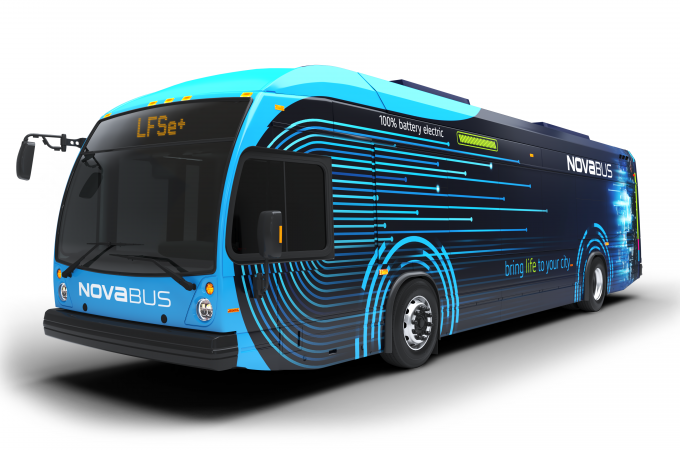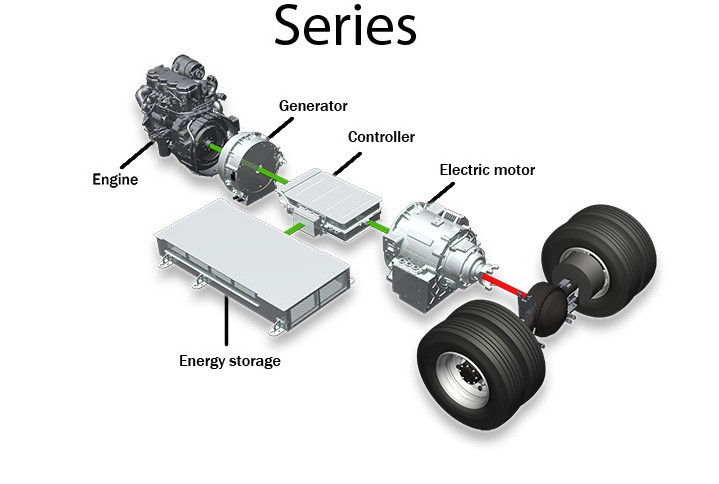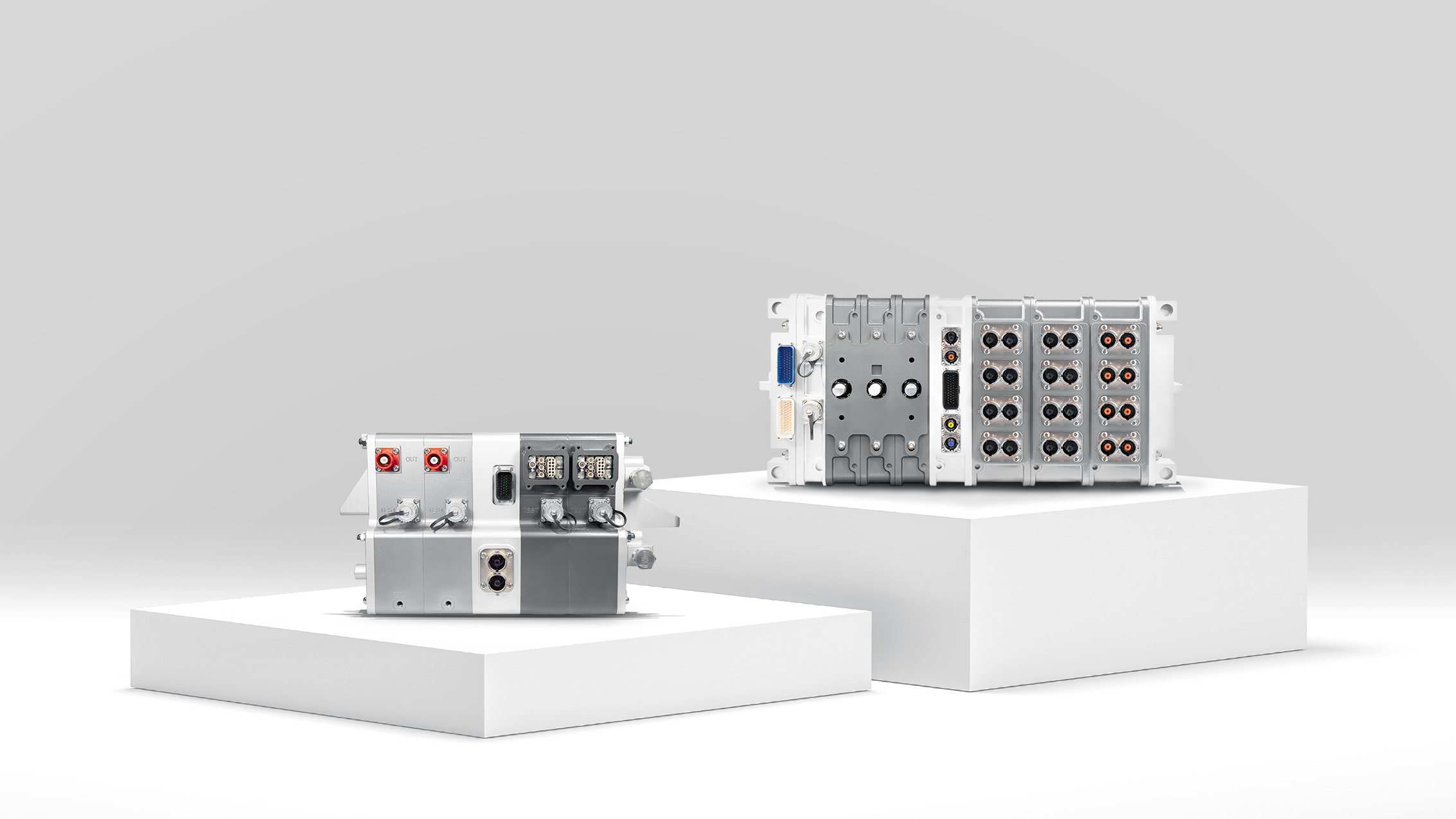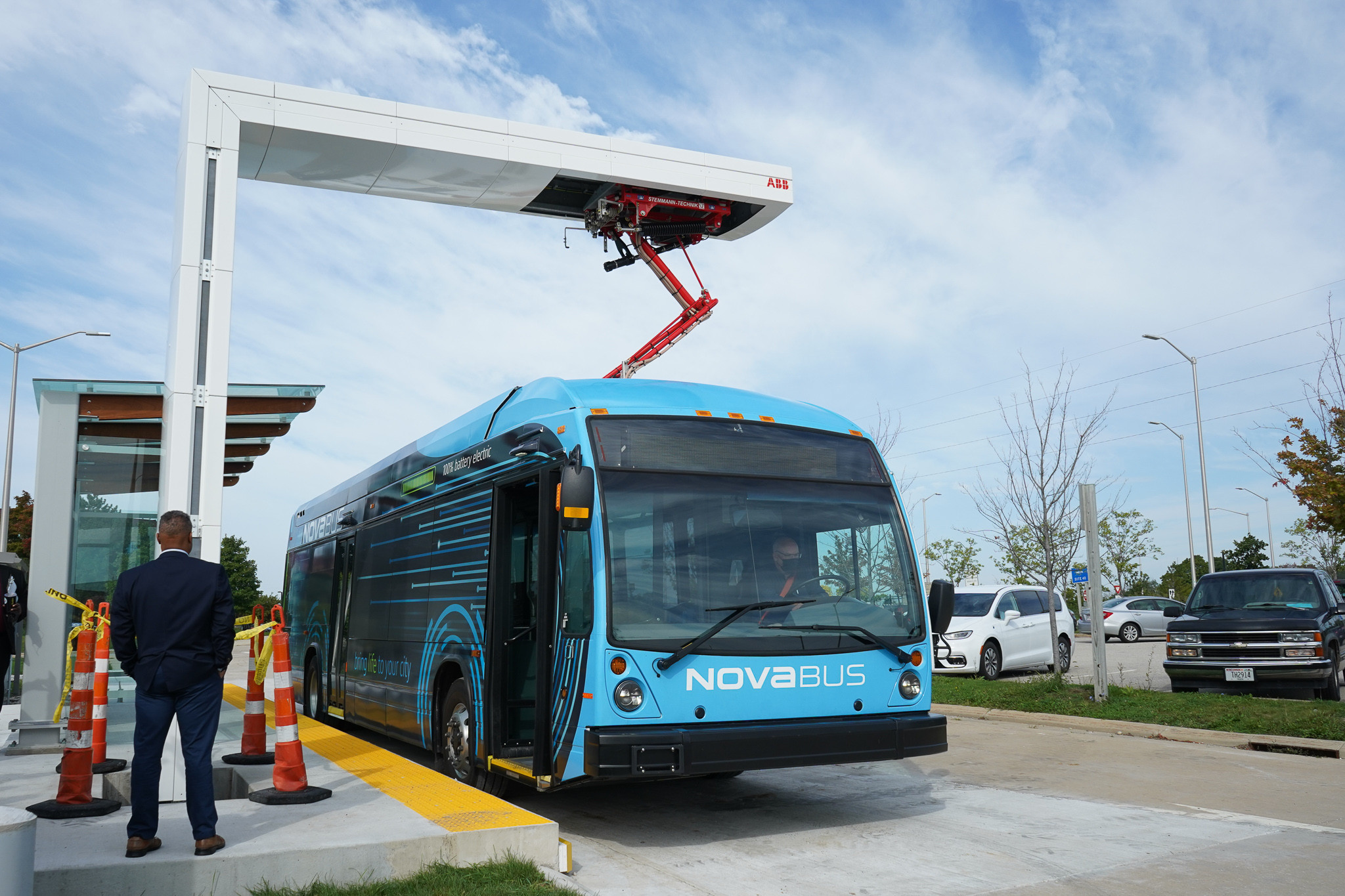More than a decade of partnership between Nova Bus and BAE Systems delivers zero emission buses to Texas
By Jim Gibbins - 7th October 2022

NovaBus LFSe+ long range city bus with BAE Systems powertrain
USA / Canada – With the latest Gen3 power electronics and integrated powertrain from the Power & Propulsion Solutions business of BAE Systems Inc* based in Endicott, New York, Canada's premium quality city bus builder, Nova Bus Inc of Saint-Eustache, Quebec, will start delivery of the first of 40, fully electric LFSe+ BE buses to the Metropolitan Transit Authority of Harris County in Texas, USA in the fourth quarter this year.
Perhaps of high significance to this order, which was placed back in April this year and represented the largest Nova Bus had received for the LFSe+ to date, is that the battery electric bus is a culmination of more than a decade of cooperation between BAE Systems and Nova Bus; this relationship in that time period has successfully delivered more than 2,400 Nova Bus hybrid buses to cities in Canada and New York City in the USA. Over the years the companies have delivered buses with various iterations of BAE Systems’ series hybrid propulsion system, gradually delivering lower emissions through longer periods of engine off, electrically powered, zero emission operations.
…………………………………………………………………………………………………
Quick facts - Nova Bus and BAE Systems:
· Since 2014, Nova Bus has fielded more than 2,400 electric hybrid transit buses featuring BAE Systems’ electric drivetrain and power management solutions.
· 2,000 of the 2,400 buses have been deployed in the province of Quebec; Toronto and Vancouver in Canada and New York City (NYC), USA, have the largest fleets outside of Quebec.
· Montreal, Quebec province, has 800 BAE Systems-equipped Nova Bus hybrid buses.
· Largest hybrid order was from New York City in 2019 for 485 hybrid buses (from New Flyer and Nova Bus, of which, 435 of these were with BAE drivelines).
· Demand for hybrids continue: On December 16, 2021, Mississauga Transit (aka MiWay) approved an award for 165 electric hybrid transit buses powered by PPS’ Series-ER propulsion & accessory power systems. In early March 2022, Toronto Transit Commission (TTC) awarded 337 electric-hybrid transit buses powered by PPS Series-ER propulsion and accessory systems across two bus manufacturers, New Flyer and Nova Bus; a long-time customer which still has some of our Gen1 products in service. The award from TTC also included options for up to 1,200 additional buses to TTC and surrounding Toronto metro area transit operators such as Mississauga Transit.
· October 2019 saw Nova Bus announce its latest long-range battery electric bus, the LFSe+, at the annual APTA Transform Conference in NYC.
· The LFSe+ features BAE Systems’ Gen3 power electronics. It utilizes the same electric motor drivetrain as Nova Bus’s electric hybrids with BAE Systems.
· Quebec City’s RTC was the first Canadian transit bus fleet to deploy geo-fenced ‘Green Zones’ with BAE Systems stop/start engine technology for zero emissions operations within the historic downtown area.
Source: BAE Systems
…………………………………………………………………………………………………
BAE Systems - Series architecture, a strategy decision
Perhaps a key factor in the successful relationship between BAE Systems and Nova Bus is the system architecture used by BAE Systems. BAE Systems’ strategy has always been to offer Series architecture, which means that the traction drive is always through the electric motor making the driveline power source agnostic. In other words, the power source can be an ICE (gas, diesel or even hydrogen), batteries, hydrogen fuel cells, a mixture of the two or more source, or any other power source that can be stored and mobilised.

Series hybrid configuration. The engine and the generator can be replaced with HFCs or an additional battery pack.
Subsequently, the advantage of the NB LFSE+, which is the drive platform that BAE Systems has designed, is that it has the exact same proven electric motor driveline (with some updates) in the hybrid version as that of the battery electric, since 2014. This is a feature that Nova Bus actively promotes to its customers.
Introduction of Stop Start and Arrive & Go – and zero emissions operations
During the twenty-teens, BAE Systems started to introduce engine off options with its hybrid-drive propulsion system.
Stop/Start (SS) is when the bus is stationary and the engine is off and there is only a requirement for ‘body’ operations like air conditioning or door operation, and there is no requirement for components that contribute to moving the vehicle, such as power steering. Introduction of engine Stop/Start (SS) with BAE Systems was first introduced with Nova Bus in the Quebec province, in Montreal and Quebec City in 2016/17.
Arrive & Go (AG) is when the vehicle is moving, the engine is off and there is electrical power to drive all ancillary components such as including the power steering. When the engine is turned off for AG, this is determined by geofencing, which is decided by the operator when accessing city areas like pedestrian precincts and ancient parts of cities which have zero emission zones. Quebec City was the first city where it started geofencing operations, turning the thermal engine off and transiting using electrical power only.
These two technologies were developed in North America with Nova Bus (as well as New Flyer, another key BAE Systems’ customer) and brought into Europe, the first market being the UK, as proven technology in 2018. (The first use of SS in the USA was with New Flyer at Minneapolis’s Metro Transit in 2012. Nova Bus first put it into service with RTC in Quebec in 2016).
Today BAE Systems offers two hybrid systems, Series-E and Series-ER. Series-E is with 1kWh ultracapacitors for limited engine off operation. ER has the 32kWh battery pack for geofencing zero emission operations of up to three miles.
BAE Systems and Nova Bus announces partnership to develop battery electric bus
Series-EV is BAE’s full series electric system, which can be supplied with batteries or without; a decision taken by the OEM. While Nova Bus sources its own battery packs, BAE can offer its own batteries, which are regularly evaluated against real duty cycles with its own system.
October 2019 at APTA in Atlanta was when BAE systems formerly announced its partnership with Nova Bus to develop a battery electric bus through their respective product development centres, BAE Systems in Endicott, New York and Nova Bus in St Eustache.
Covid hit shortly after the start of the project and so much of the development was done through teams, working virtually. BAE Systems pointed out that this was achievable mainly because of the commonality of systems architecture used with the hybrid drivetrain and that of the battery electric system, as John Hroncich, director of North American transit sales at BAE Systems Power & Propulsion division explained:
“A hybrid with engine and Stop/Start has the same set of electrified components as does a battery electric bus. Our earlier generation hybrid, without SS and no electric accessories, could be an apt comparison; as from our earliest hybrids to engine SS hybrids (and eventually zero emission buses), we had to incorporate accessory power systems to provide power to power steering, compressors, lighting, fans and HVAC systems.”
One issue when BAE Systems was first developing its SS or AG for its hybrid system, Hroncich continued, was a lack of suppliers of electrical componentry. Today, of course, there are many more sourcing options of electrical components from suppliers than before, which allows for better systems integration and more efficient optimization, Hroncich added.
BAE Systems adopts modular systems approach
As the market has shifted away from hybrid drive systems in the last few years - although BAE Systems suggests there remains a compelling case for hybrids in certain applications, such interurban operations, especially when matched together with clean emission power sources (biomethane or hydrogen) - BAE Systems has made investments to prepare itself for the growing demand for fully electric heavy-duty commercial vehicles. Its focus, subsequently, has been on making its systems more modular and on advancing component technology. For instance, a key focus has been on battery technology research and on that of other core components. The new Series EV, for instance, now features new inverters and the new Gen3 power electronics. As part of this investment in full electric architecture, it has a new product line, testing and validation facility in Endicott.
BAE Systems says Nova Bus is the first OEM to get the new hardware, which whilst it is more advanced, it is also more modular. So, if a bus requires more batteries or larger size inverters to better match the duty cycle it will be operating on, these can be simply added, or removed, as required. Another advantage of the modular system, BAE Systems pointed out, is that it is more flexible in terms of opening new markets.
Highlighting its advancements in power electronics in its drive systems, BAE Systems, in a statement said: “Using a modular design, BAE Systems’ next-generation power electronics provide scalable, efficient, and lightweight solutions for battery electric, fuel cell, and electric-hybrid vehicles.”

BAE Systems’ next-generation power electronics
Altoona test validation
On September 8th, Nova Bus announced its long-range 100% battery-electric bus, the LFSe+ with BAE Systems Series-EV electric drivetrain had successfully completed the Bus Testing Program of the Federal Transit Administration (FTA) operated by the Altoona Bus Testing Center in Pennsylvania. This is a rigorous evaluation of the bus, which aims to certify the safety and efficiency of buses through a series of tests whose results are objectively analysed.
In addition to attesting the reliability of the LFSe+, the FTA certification allows future transit bus buyers to access various US federal subsidy programs and to comply with contractual criteria of certain Canadian customers. The successful completion of these tests therefore allows Nova Bus to position itself strategically on the North American market.
The LFSe+ buses intended for the Canadian market are assembled at the Saint-Eustache plant in Quebec and those intended for the American market, at the Plattsburgh plant in New York State.
Promotional tour of the USA
BAE Systems is currently supporting Nova Bus on a cross continent bus tour with the LFSe+ BE transit bus. The demonstrator has plug-in overnight charging with a 50kW mobile charger on board, should it be needed.
Milwaulkee is the first city in the USA to get the Nova Bus LFSE+ BE – it has overhead charging, but this is not common in the USA.

LFSe+ at a Pantograph Fast Charging Station
*BAE Systems Power & Propulsion Solutions business
The Power & Propulsion Solutions business is part of the Electronic Systems sector within BAE Systems Inc. Electronic Systems represents a significant element of the total company revenue, comprising circa. 21% of BAE Systems PLC in total. With Power & Propulsion Solutions constituting around 4% of Electronic Systems revenues in 2021. Revenues for the Electronic Systems sector in 2021 generated circa. GBP4.5 billion.
Below: Power & Propulsion Solutions revenue relative to other businesses within the Electronic Systems sector, which totalled GBP4.5bn in 2021.
Extracts from BAE Systems annual report for 2021, said: “Despite the impacts on travel from the pandemic, the demand for low and zero emission vehicles is rising as air quality and climate change ascend the global agenda. In addition to existing low emission electric hybrid and zero emission battery electric options, BAE Systems now offers a hydrogen fuel cell electric propulsion system in collaboration with Plug Power, Inc.”
“Hybrid bus procurements continue in cities such as Namur, Belgium and Boston, Massachusetts, in the US, and we anticipate large procurements in Philadelphia, Pennsylvania and Mississauga in Canada. Bus manufacturer Nova Bus has successfully integrated our Gen3 electric drive system to power its new LFSe+ battery electric buses and has sold these electric buses into ten transit properties, including San Francisco Municipal Transportation Authority, which will begin to transition its fleet from BAE Systems-supplied electric hybrid systems to our Gen3 fully electric drive system.”
